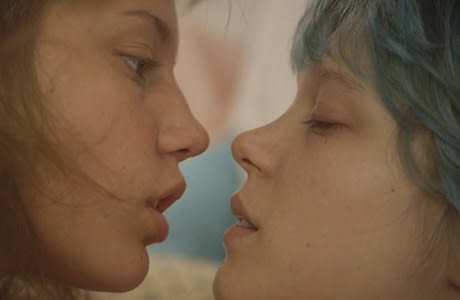Blue is the Warmest Colour is a film with many layers. The one you need to get past is the controversy that ignited when the film premiered at the Cannes Film Festival last May. Yes, there are lengthy sex scenes between the two leads, Adèle Exarchopoulos and Léa Seydoux. Played out within a three-hour running time, however, those scenes represent just a small portion of the larger story — and a very ambitious film.
A chance encounter while crossing the street leaves teenager Adèle (Exarchopoulos) not just thinking about Emma (Seydoux) for days, but soon questioning her sexuality and exploring a gay bar. When Adèle does reconnect with Emma, it's met with a mutual attraction but not sex. Director Abdellatif Kechiche opts instead for a slow-burn of a courtship, tracing every quick glance and nervous laugh in the characters' first love.
The French title for the film, La Vie d'Adèle – Chapitres 1 & 2 (or "The Life of Adèle – Chapters 1 & 2") might better prepare audiences for the leaps the narrative takes, which eventually covers ten years in the lives of these characters. It's Chapter 1 that contains the controversial scenes that you've heard about, but it might actually be Chapter 2, which chronicles a very different period in the same relationship, that really rubbed particular audiences the wrong way. It's the lasting effects of the relationship between these two women that confirms the undeniably deep emotional connection that the earlier sex scenes suggest.
Blue is the Warmest Colour poignantly mirrors every emotion of the relationship it depicts, including a bittersweet but unavoidable ending. The bare-bones DVD release includes a half-hour interview with the director, which is interesting but doesn't shed much light on the abstract appeal of the film. The announced rerelease may be more comprehensive but it could be that, in this case, less is more.
(Mongrel Media)A chance encounter while crossing the street leaves teenager Adèle (Exarchopoulos) not just thinking about Emma (Seydoux) for days, but soon questioning her sexuality and exploring a gay bar. When Adèle does reconnect with Emma, it's met with a mutual attraction but not sex. Director Abdellatif Kechiche opts instead for a slow-burn of a courtship, tracing every quick glance and nervous laugh in the characters' first love.
The French title for the film, La Vie d'Adèle – Chapitres 1 & 2 (or "The Life of Adèle – Chapters 1 & 2") might better prepare audiences for the leaps the narrative takes, which eventually covers ten years in the lives of these characters. It's Chapter 1 that contains the controversial scenes that you've heard about, but it might actually be Chapter 2, which chronicles a very different period in the same relationship, that really rubbed particular audiences the wrong way. It's the lasting effects of the relationship between these two women that confirms the undeniably deep emotional connection that the earlier sex scenes suggest.
Blue is the Warmest Colour poignantly mirrors every emotion of the relationship it depicts, including a bittersweet but unavoidable ending. The bare-bones DVD release includes a half-hour interview with the director, which is interesting but doesn't shed much light on the abstract appeal of the film. The announced rerelease may be more comprehensive but it could be that, in this case, less is more.
